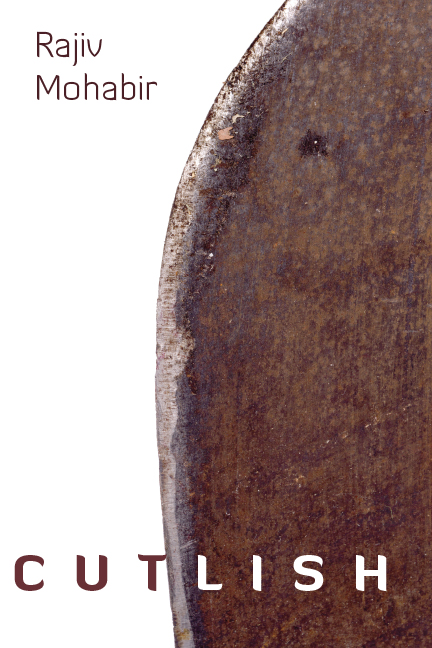
paper • 116 pages • 16.95
ISBN-13: 978-1-945588-88-4
In Cutlish, a title referencing the rural recasting of the cutlass or machete, Rajiv Mohabir creates a form migrated from Caribbean chutney music in order to verse the precarity of a queer Indo-Caribbean speaker in the newest context of the United States. By joining the disparate threads of his fading, often derided, multilingual Guyanese Creole and Guyanese Bhojpuri linguistic inheritances, Mohabir mingles the ghosts that haunt from the cane fields his ancestors worked with the canonical colonial education of his elders, creating a new syncretic American poetry — pushing through the “post” of postcolonial, the “poet” in the poetic.
COOLIE
Coolie naam dharaiya je hamke tej pakardaye
cutlish jaisan kate hamke Guyanwa mein aaike
With this whip-scar iron shackle name Aja
contract-bound, whole day cut cane; come night he drink
up rum for so until he wine-up and pitch in
the trench’s black water and cries, Oh Manager!
until sugar and pressure claim he two eyes.
De backra manager laugh we—so come so done.
I was born a crabdog devotee of the silent
god, the jungle god, the god crosser-of-seas. White tongues
licked the sweet Demerara of my sores. Now
Stateside, Americans erase my serf story;
call me Indian. Can’t they hear kalapani
in my voice, my breath’s marine layer when I say?
They made us hold the name Coolie,
like a cutlass it bit us coming to Guyana.
Rajiv Mohabir’s Cutlish uses history to interrogate the word ‘home’ and all that it might mean to those who thrive in spite of homophobia, stereotype, and xenophobia. These poems are grounded in definite time and space in a voice that refuses to be silenced, ‘They are vexed you survive; that you / rise up from the pavement…’ But what I love most is to read a poet as disciplined and committed as Mohabir as he transforms and reinvents himself in tone, in subject, and in line: ‘Let’s get one thing queer—I’m no Sabu-like sidekick, / I’m the main drag. Ram Ram in a sari; salaam // on the street. I don’t speak Hindu, Paki, or Indian, / can’t control minds, have no psychic powers.’
Cutlish, Rajiv Mohabir’s stunning new collection, asks urgent questions about queer identities, diaspora and silence. Deeply grounded in 1838, the year the first ships brought indentured servants from India to Guyana, Cutlish reckons with the relationship between language and violence. These poems challenge the colonizer’s English through Creole, Sanskrit, Hindi, Hindustani and Chutney songs, dazzling us at every turn: ‘May each face who ever said, Speak English / find their own tongue fettered and split, / my mixed blood blackening their faces.’ The book’s title evokes the violence of a cutlass, and everywhere here we see language as knife and blade but also as solace. Cutlish is a luminous, beautiful book. Rajiv Mohabir is one of the most important poets writing today.
Rajiv Mohabir’s polyglottal collection will reward you with its formal boldness and gorgeous intimacy. I didn’t know that I came to contemporary poetry to find the end of English, until I read Cutlish. Here, Mohabir leads us enthusiastically to the edges of language—torn, improvised, as well as deftly carved—where music and meaning are visually and sonically sumptuous. This is a stunning book.